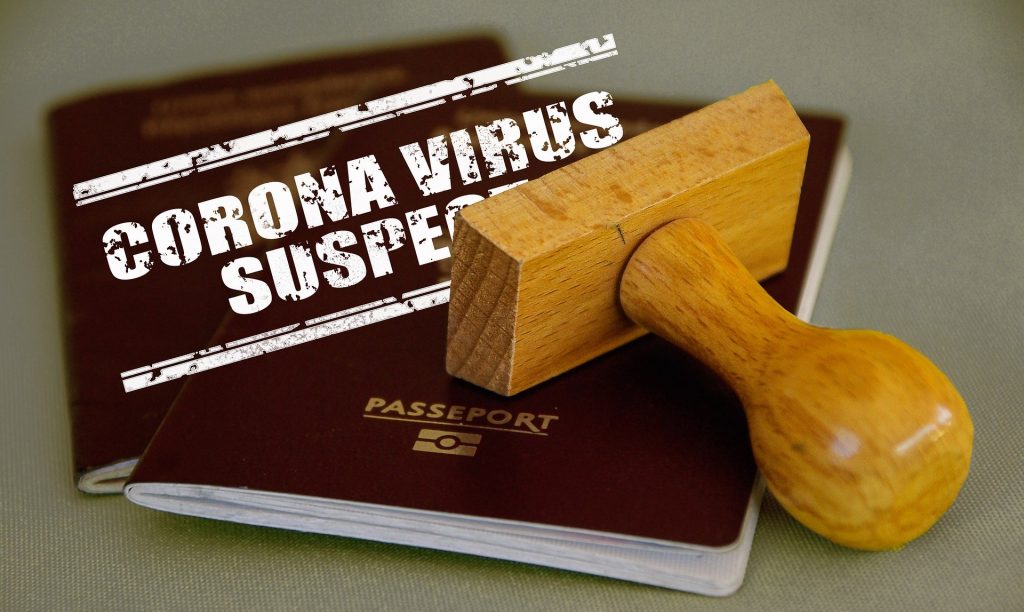
In this blog, we will try to give a response to the question if Coronavirus can be considered as a Force Majeure Event? This analysis focuses primarily on the FIDIC Conditions of the Contract 1999 edition, but a similar approach can be used for all other Contracts, depending on the formulations in the Contract. In addition, herein you can find the template of a letter for Coronavirus as a Force Majeure event.
What is Coronavirus?

Coronavirus is a virus isolated in Wuhan, China in 2019. Its original name is SARS-CoV-2. Usually, it lives inside the animals. When it is transferred to humans, it is easily transferable between the people. An infectious disease caused by the SARS-CoV-2 is called COronaVIrus Disease 2019 (COVID-19). Currently, there are no vaccines or treatments for this disease. More information about Coronavirus is available on the website of the World Health Organization (WHO).
Coronavirus pandemic announcement by the World Health Organization
On 11th March 2020 WHO declared a pandemic of Coronavirus:
What is the effect of Coronavirus on Construction Business?
This was the trigger for many countries to start the fight against this invisible enemy. The easiest way for transmission of Coronavirus is direct contact between two persons. Therefore, one of the first measures to protect humans is to limit physical interaction between people in general.
Government measures
In order to reduce physical interaction between the people, many governments introduced the following measures:
- Emergency state
- Travel restrictions
- Closing of the borders
- Closing kindergartens, schools, and universities
- Ban on public gatherings
- Limiting movement of the people
- Defining minimum distance between two persons (for example at least 2 m)
- Limiting the number of people in one group (for example a maximum of 5 people)
- Limiting the number of people in one car (for example a maximum of 2 people)
- Suspending public transportation
- Closing shopping centers, bars, and restaurants
- Closing of the Construction Sites
Impact on Construction Sites
Directly or indirectly, the above-mentioned measures also significantly affect Construction Sites in such a manner that only smaller Construction Sites can function in the pandemic state. Such measures have a severe negative impact on normal business activities.
Those measures are causing a new economic recession. The construction Business is not protected at all. On the contrary, every economic recession starts and ends in Construction Business. During the last few years, Construction Business, in general, was in expansion. Everyone was asking the same question: “How long it will last?”. The answer came like thunder from the clear sky: “Up to now!”. What can you do now to try to protect your business? You can seek your rights from the other Party.
Proving Coronavirus as Force Majeure event
In Sub-Clause 19.1 of FIDIC Conditions of the Contract, there is a list of Force Majeure events. If you read it, you will find out that almost everything is mentioned that you can think of (even some things that you could not think of), except the “epidemic” or “pandemic”. On the other side, if you read it carefully, you will notice that before the list, there is formulation: “Force Majeure may include, but is not limited to,…”. Therefore, the list of Force Majeure events or circumstances provided in FIDIC Conditions of the Contract is not exhaustive.
Can you classify Coronavirus as Force Majeure event?
How can you prove that the Coronavirus pandemic is actually a Force Majeure event, although pandemic or epidemic is not included in the list of Force Majeure events in FIDIC Conditions of the Contract?
As per Sub-Clause 19.1 of FIDIC Conditions of the Contract, the “Force Majeure” means an exceptional event or circumstance:
- which is beyond a Party’s control,
- which Party could not be reasonably have provided against before entering into the Contract,
- which had arisen, such Party could not reasonably have avoided or overcome and
- which is not substantially attributable to the other Party.
As you can see from the above, certain event or circumstances must meet all four conditions (a) to (d) in order to be a Force Majeure event or circumstance.
One important additional condition is that you signed the contract before the Coronavirus outbreak. If that is the case, then in general, the Coronavirus pandemic fulfils all the conditions of Force Majeure event as per FIDIC Conditions of the Contract.
Additional evidence: Certificate for Coronavirus as Force Majeure event
Depending on the country of the Contract, each Party has the option to ask the local Trade Commission or Chamber of Commerce to issue the so-called Certificate for Coronavirus as a Force Majeure event. For example, in China, companies can ask The China Council for Promotion of International Trade to issue Force Majeure Certificate. Such a certificate can be used to prove that the Party could not perform the obligations and duties as per the Contract.
By itself, the Force Majeure Certificate is not sufficient to prove that the Coronavirus event is Force Majeure. But it can be additional evidence in the effort to prove the Parties’ claim of Force Majeure.
Notice of Force Majeure event (Notice No. 1)
When a Force Majeure event or circumstance occurs, what you should first do? Notify the other Party.
As per FIDIC Conditions of the Contract, Sub-Clause 19.2, each Party (the Contractor and the Employer) has the obligation to notify other Party if it is or will be prevented from performing any of its obligations under the Contract by Force Majeure. The notice should be given within 14 days from the date when the Party became aware or should have become aware of the event or circumstance constituting Force Majeure. The notice should specify the obligation and performance, which the Party is prevented to conduct, because of the Force Majeure.
Preventing of the performance and obligation
The Party will be excused from the performance of the obligations per the Contract as long as such Force Majeure prevents it from performing them. However, Force Majeure does not apply to the obligations of either Party to make payments to the other Party under the Contract. This means that all the payments, which are due, must be paid by the Party, notwithstanding the occurrence of the Force Majeure.
Furthermore, it is very important to note that both Parties do have the obligation to minimize the delay in the performance of the Contract because of Force Majeure.
A letter template of Notification for Coronavirus as Force Majeure event
We have prepared for you a letter template of Notification for Coronavirus as a Force Majeure event. In order to receive it, please fill in the contact form below and we will send it to your e-mail address right away!
Next Step? Notice to Claim (Notice No. 2)
Once you notified the other Party about Force Majeure occurrence, the next step is the issuance of Notice to Claim (Notice No. 2).
As per Sub-Clause 19.4 [Consequences of Force Majeure] the Contractor is entitled to:
- Extension of Time for Completion
- Additional Costs (under certain conditions), but not profit
Application of Sub-Clause 8.4
Furthermore, Sub-Clause 8.4 [Extension of Time for Completion] defines the Contractor’s entitlement to the Extension of Time for Completion in item (d):
“Unforeseeable shortages in the availability of personnel or Goods caused by epidemic or governmental actions…”
Both of the above-mentioned Sub-Clauses define that the Notice to Claim should be submitted in accordance with the procedure defined in Sub-Clause 20.1.
Claim procedure as per Sub-Clause 20.1
Therefore, in accordance with Sub-Clause 20.1 Notice to Claim should be issued within 28 days from the date of Force Majeure event or circumstance.
In addition, within 42 days from the date of the Force Majeure event or circumstance, the Contractor has the obligation to issue a Fully Detailed Claim. If Force Majeure event or circumstance has a continuing effect, the Fully Detailed Claim shall be considered as Interim Claim. The Contractor has the obligation to issue Interim Claims at monthly intervals giving accumulated delay and/ or amount claimed.
The end of Coronavirus as Force Majeure event (Notice No. 3)

When the Force Majeure event or circumstance ceases to affect the performance of the Party as per the Contract, the Party shall issue Notice to the other Party (Notice No. 3). No timeframe is defined for this notice in the Contract.
Final Claim should be issued within 28 days after the end of the Force Majeure event or circumstance.
Prolonged non-performance
If the Force Majeure event or circumstance is causing prolonged non-performance for more than 84 days, the provisions of Sub-Clause 19.6 [Optional Termination, Payment and Release] define that either Party can terminate the Contract by giving notice of termination of the Contract.
Termination shall take effect 7 days after the notice is given.

Please note that all the above mentioned heavily depend on the formulations of Particular Conditions of the Contract which are different for each Contract.
If you need any help with the preparation of Notices for Force Majeure, please do not hesitate to contact us.
Disclaimer
Everything mentioned in the blog above represents solely the opinions and conclusion of the author unless otherwise indicated. The information in this blog is not and cannot be considered as legal advice for any particular situation. The author has provided the links referenced above for information purposes only and by doing so, does not adopt or incorporate the contents.
This document was produced by the Construction Claim Team and is provided for informative purposes only. The contents of this document are general in nature and therefore should not be applied to the specific circumstances of individuals. Whilst we undertake every effort to ensure that the information within this document is complete and up to date, it should not be relied upon as the basis for investment, commercial, professional or legal decisions.
Information given in this document must not be relied upon as an alternative to legal, medical, financial, tax, accounting or any other advice from appropriately qualified professionals, governmental agencies or health organizations. In any of the circumstances, you should consult an appropriately qualified professional, relevant governmental bodies and/or health organizations.
Construction Claim Team accepts no liability in respect to any claims, any direct, indirect, implied, statutory, and/or consequential loss, including without limitation business losses, loss of or damage to profits, income, revenue, production, anticipated savings, business, contracts, commercial opportunities or goodwill arising from the use of this document or its contents. No part of this report may be copied either in whole or in part without express permission in writing.
